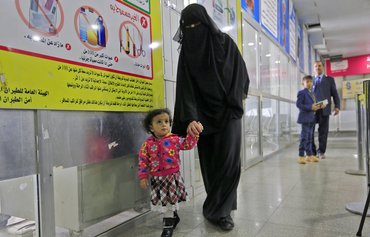The Yemeni government's supreme emergency committee for combating novel coronavirus (COVID-19) has decided to set up medical quarantine facilities in three provinces to accommodate citizens stranded abroad.
Under the new plan, Yemeni citizens arriving back in the country are to be placed in quarantine for a 14-day period to ensure they are not infected with coronavirus, the committee said.
At its April 20th meeting, the committee approved mechanisms for facilitating the return of an estimated 15,000 to 20,000 Yemenis who are stranded abroad.
Yemenis stuck overseas have appealed to the government to intervene and evacuate them, as other countries have done with their citizens. The most recent appeal came on April 20th, from Yemeni citizens stranded in India.
Yemen's cabinet had on April 15th called on the committee to submit a complete and urgent report on the number of people stranded and their whereabouts, and to identify mechanisms that can be implemented to bring them home.
This could include arranging for their return and placing them in quarantine, after preparing quarantine facilities for this purpose, or providing them with other kinds of assistance to meet their needs where they are for the time being.
The committee is to co-ordinate its work with the ministries of foreign and expatriate affairs, in light of the closure of Yemen's land, sea and air ports until further notice, excepting commercial and relief shipments.
Establishing quarantine centres
Deputy Prime Minister Salem al-Khanbashi, who chairs the emergency committee, directed provincial governors to find and prepare suitable quarantine locations, where returning citizens can stay for two weeks.
Al-Khanbashi called on Aden and Hadramaut provinces to set up quarantine centres in Aden, al-Mukalla and Seiyun, since stranded citizens will be returning to the country through their airports.
Yemen announced its first coronavirus infection on April 10th in Hadramaut and on April 29th recorded its first two deaths from the virus, along with five new cases in Aden.
"The government has a duty to help stranded Yemenis stuck abroad," said Deputy Minister of Public Health and Population Abdul Raqeeb al-Haidari.
The host countries were forced to implement measures to prevent the virus from spreading that included the closure of airports, stranding some Yemeni citizens, he told Al-Mashareq.
Most of the stranded citizens "are patients who traveled abroad for treatment, individuals who accompanied them, students and some who traveled on short assignments", he said.
They are stranded mostly in Egypt, Saudi Arabia, Jordan, India and Djibouti.
"Setting up quarantines [for returning travellers] for a period of 14 days is very important to ensure they do not spread the virus to Yemen," al-Haidari said.
Taking care of stranded Yemenis
Deputy Minister of Expatriate Affairs Mohammed al-Adil told Al-Mashareq the emergency committee has allocated funds to care for the stranded.
"There also is ongoing co-ordination between the embassies abroad and the ministries of health and expatriate affairs to get a census of the stranded," he said.
All those who are stranded abroad will be taken care of, and some will receive financial assistance, he said, with the most urgent cases taking precedent.
Most of the stranded Yemenis "are patients who have run out of money due to the delay in their return to their home country", he said.
To help them during this time, Yemeni diplomatic missions have been providing relief assistance, in co-operation with business entities and individuals and relief committees formed by Yemeni communities in these countries.
Hadramaut governor Faraj al-Bahsani ordered the transfer of $59,000 to stranded Hadramaut natives to help them during this time.
"Arranging the return of about 20,000 stranded citizens is not an easy matter and requires concerted efforts to bring them back gradually, based on the degree of necessity to return," political analyst Faisal Ahmed told Al-Mashareq.
The quarantines "will be set up in rented hotels or buildings to accommodate these large numbers", he said, adding that "it also is necessary to help those whose return will be delayed".

![Yemen's Minister of Foreign Affairs Mohammad al-Hadhrami attends a meeting for top diplomats of Arab and African coastal states in Riyadh on January 6th. Yemen's foreign and expatriate affairs ministries have been working with a government committee to help Yemeni citizens return home amid the coronavirus crisis. [Fayez Nureldine/AFP]](/cnmi_am/images/2020/05/05/23846-Yemen-foreign-minister-600_384.jpg)







Happy Eid! Many happy returns!
Reply20 Comment(s)
Yes, the Magis and Abul Hassan al-Sabah, owner of the eagle's nest in Asfahan and an extension of Assassins Movement through history.
ReplyShall We then treat the People of Faith like the People of Sin? (35) What is the matter with you? How judge ye? (36). Surat al-Qalam
ReplyOnly Humairis are Yemenis = only Humairi and the descendants of Sam are Yemenis. No Hashemi is Humairi = No Yemeni is Hashemi. Every Hashemi is an Arabised Qurayshi and not from Qah (from the ancestry of Ismail whose mother was a maid.) I mean a servant, unlike Ishaq whose mother was a free woman.
Reply20 Comment(s)
The dogs of Persia are a tool in the hands of the West.
ReplyIran has for long been the biggest agent of the West and Israel in the Middle East. The West considers it to be its policeman in the East.
ReplyEvery Hashemi Qah is rude. The people of Beni Hashem don’t leave the land of their grandfathers. Who are they? They are hybrid Arabs who aren’t Yemenis. How can they come and rule and control the grandchildren of Sam, the father of Arabs?
Reply20 Comment(s)
We’re warning against the spread of the coronavirus in Yemen. This is because it’ll be very tragic for the Yemeni people and Arabs given the current conditions in Yemen.
ReplyThe coronavirus may kill 30% of Yemenis if it isn’t confronted with greater awareness and other precautionary measures.
Reply20 Comment(s)
These cases might have actually taken place. However, those who are overseeing treatment fear to be infected, on the one hand, and hospitals also fear they would be closed, on the other hand. There is a misunderstanding that hospitals may turn from treating facilities to hotspots for the transmission of infection.
Reply20 Comment(s)
No, Iran is sabotaging Yemen.
ReplyIran doesn’t just want to destroy Yemen, but it has bigger ambitions, including controlling the Arabian Peninsula. These are the dreams of Khosrow.
Reply20 Comment(s)
Sadeq Aiqan Qassim Ali Aiqan. I’m from Yemen. We call upon the world to help us combat the coronavirus.
ReplyCoronavirus is more dangerous than other diseases, like TB. It started to spread and then arrived in Taiz. There are many cases, and it has the same symptoms. However, the incubation period, as per the specialists, doesn’t exceed 7 hours.
Reply20 Comment(s)
Yemenis are tormented; wherever there are weapons, there is poverty. There is no power or might save in God Almighty!
ReplyAnd also ignorance
Reply20 Comment(s)
We congratulate all the people of Yemen whether inside or outside the country on the anniversary of the Yemeni unification on May 22nd, 1990. This is considered a big step towards achieving the Arab and Muslim union. Many happy returns! Ahrar al-Yemen, Abu Alaa Adin.
ReplyUnity is a victory for those who are united. However, when this is done through annexation and the imposition of tutelage, this is called colonisation.
Reply20 Comment(s)